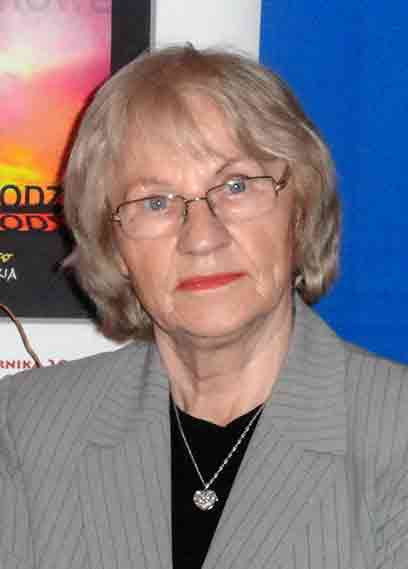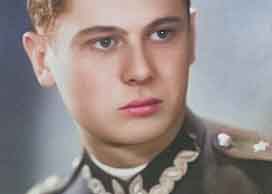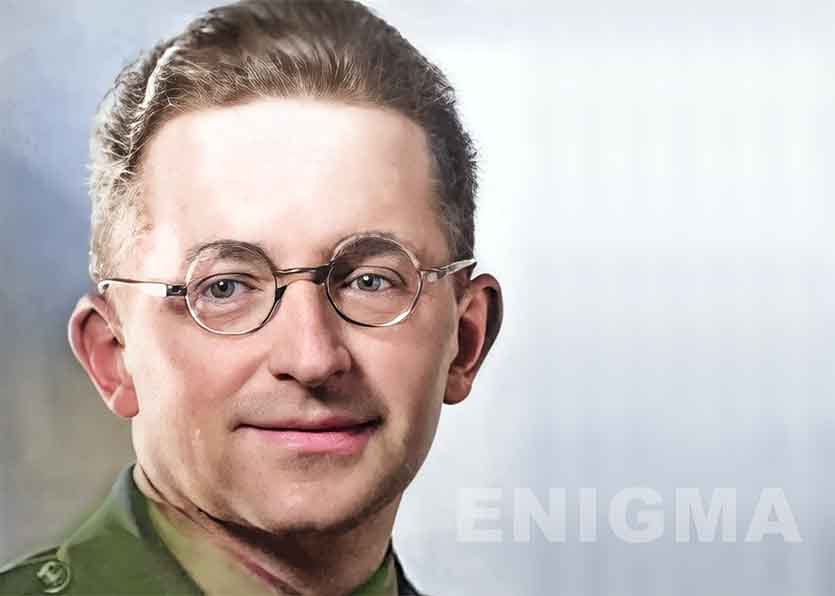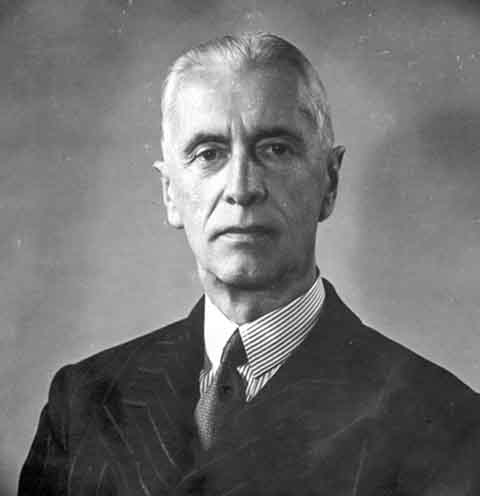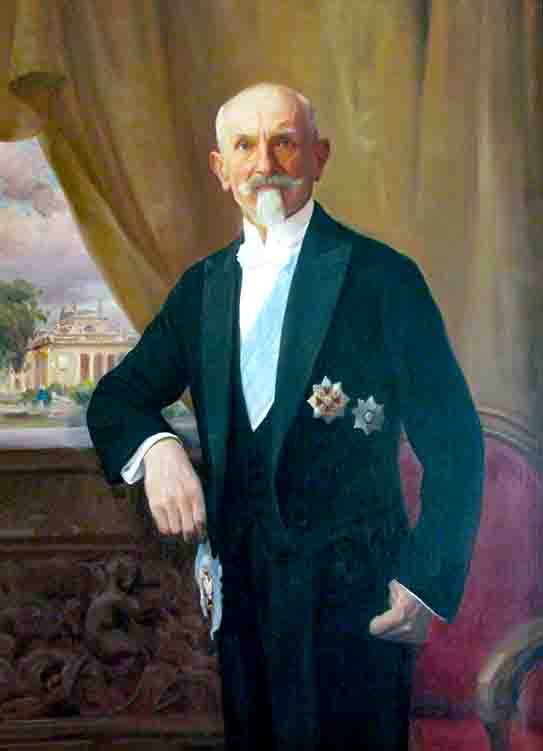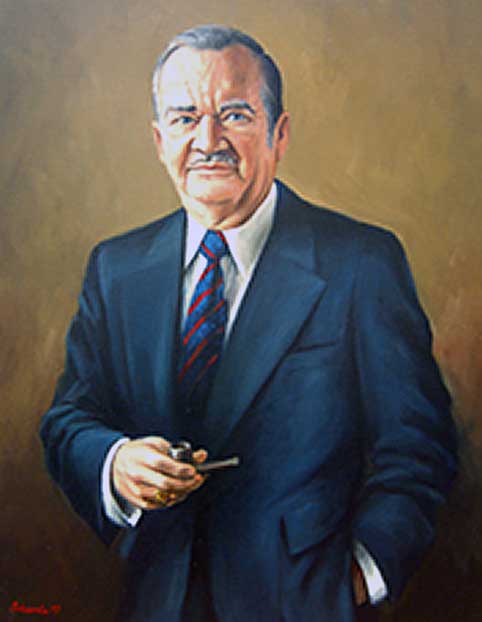In the Polish narrative about steadfast soldiers, we often forget that some of them continued their struggle for an independent and sovereign Poland in exile. The day of remembrance of the steadfast soldiers passed quietly this year and almost imperceptibly. And yet, especially now, it is possible to emphasize the merits in the activities of such steadfasts as Colonel Edmund Jerzy Banasikowski — an officer of the Polish Army, a soldier of the Home Army, co-founder of WACHLARZ (The Fan), president of the Polish American Congress in Wisconsin, Polish community activist, correspondent of Radio Free Europe. His life and conscious patriotic activity should be a model for all of us, especially for those who are entering adult life.
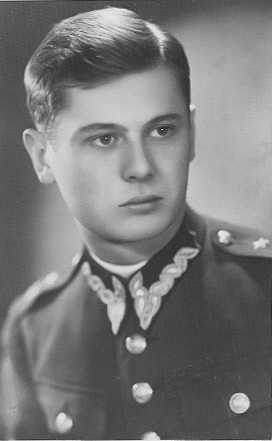
Lt. Edmund J. Banasikowski
Edmund J. Banasikowski was born on April 3, 1914 in Siedlce. His father, Władysław, was a legionnaire of Józef Piłsudski. When he left for France, his mother, Leokadia, raised three children by herself. It was not easy, especially during the crisis that affected Poland in 1929 and lasted until 1933. Considering the difficult time and respect for the Chief of the Polish State — Józef Piłsudski, Edmund Banasikowski chose a career as a professional officer. He entered the Infantry Cadet School in Komorów-Ostrów Mazowiecka, which he graduated in 1935.
He was assigned to the 23rd Col. Leopold Lis-Kula Infantry Regiment. As a young officer, second lieutenant, he marched in a funeral procession saying goodbye to Marshal Józef Piłsudski. It was an unforgettable experience for him. He knew and appreciated the Marshal's contribution to building a free Poland.

At the outbreak of World War II, he was the commander of the "Mikołów" Fortress Battalion. On the morning of September 1, 1939, his fellow officers gathered to confer and make a decision about how to defend themselves against the brutal invaders. Banasikowski ran to a nearby school for maps. When he returned, there was a deep bomb crater at the meeting place. His colleagues died. He considered his survival a miracle. He will experience similar miracles several more times in his life. He fought on. He took part in the Battle of Mokra. When on September 17 the Soviets from the east invaded Poland and it was known that the defeat was imminent, he did not lay down his arms or went into captivity. He was one of the organizers and activists of the underground struggle.
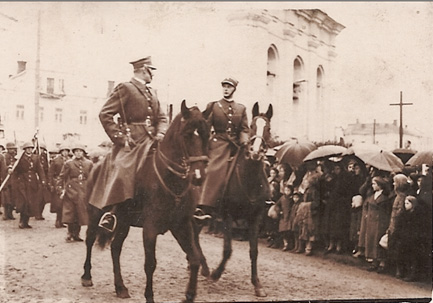
About a thousand soldiers were selected from the Union of Armed Struggle (Związek Walki Zbrojnej) and the Home Army (Armia Krajowa) for subversive activities in the east. The group took the name "WACHLARZ" (The Fan). Edmund Banasikowski was one of its creators and from 1942 he was the commander of section IV, operating in the vicinity of Połock, Witebsk and Nowla. The task of "WACHLARZ" was to destroy the railroads along which the Germans transported supplies to the eastern front. Several "cichociemni" (silent-unseens, a.k.a. special force paratroopers) fought in this group. At that time, Banasikowski was nicknamed "Jeż" (The Hedgehog).
After the reorganization of the sabotage structures in the East, he was assigned to the Vilnius district of the Home Army. On July 7, 1944, Operation Gate of Dawn began. The Home Army units attacked Vilnius, occupied by the Germans. Several days of struggle with the Red Army led to the liberation of the city on July 13. Soon after, the Soviets treacherously arrested Polish commanders and began to disarm the Home Army soldiers. Banasikowski was arrested twice by the Germans and three times by the NKVD. He always managed to avoid death. As an officer of the Home Army and the commander of many actions, an opponent of the new occupation of Poland, he knew that he could be prosecuted by the Polish communist government.
In 1945, arrested by the NKVD, he managed to escape from prison and get to Warsaw. In view of the growing Soviet terror and repression against former Home Army soldiers, he decided to leave the country. In 1946, on a ship transporting coal, he was transferred to Sweden. He took with him a deep faith that the fight for a free Poland was not over yet.
In Sweden, he met Zofia Brzozowska, a former Polish national speed skating representative at the Winter Olympics in Garmisch Partenkirchen in 1936. As a prisoner of the Ravensbrück concentration camp, she was recovering in Sweden, to restore her health and mental balance. They got married, but their troubles were not over yet. She and her daughter emigrated to the USA, he waited for the possibility of emigration for another year. In 1951, he reached the United States via Canada.
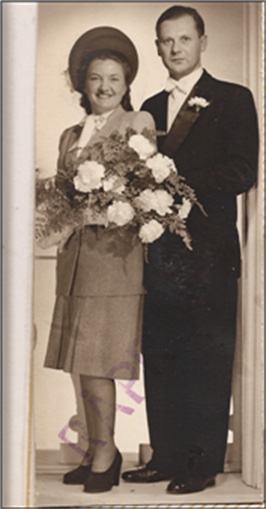
They settled in Milwaukee. From the moment he came to America, Edmund Banasikowski became the leader of the Polish community in Wisconsin. He inspired others with his attitude and commitment. He showed that Poland was alive, that Polish culture, history and traditions were admirable. During his work as the chairman of the Polish American Congress, he established close cooperation with the United States government. President John Kennedy and his brother Robert Kennedy were very favorably inclined to Polish matters.
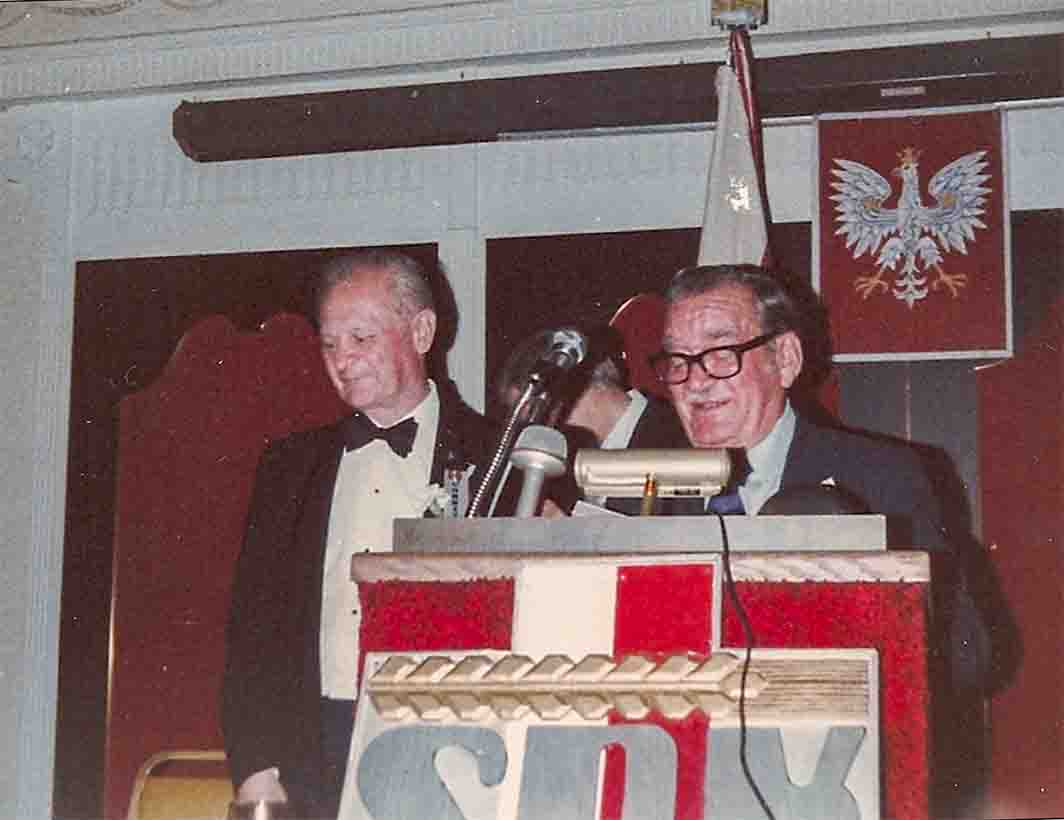
Edmund J. Banasikowski with Congressman Klemens Zabłocki
Friendship and cooperation with the Congressman from Milwaukee, Klemens Zabłocki, resulted in the US government funding the Klemens Zabłocki Hospital and Research Center in Krakow. With the help of Congressman Zabłocki, he persuaded the Chief Executive of the Post Office of the United States, John Gronowski, to celebrate the Polish Millennium by issuing a stamp with the image of the Piast eagle. On the occasion of the Millennium (1966), he organized many celebrations emphasizing the importance of Poland in history and culture.
He invited outstanding Polish artists living in America and Europe to Milwaukee. Among them, the outstanding pianist Witold Małcużyński, the opera singer Lucyna Szczepańska, the composer of the song "Red Poppies on Monte Cassino", Feliks Konarski, his wife "Helen the Volunteer" (Helenka Ochotniczka) – Renata Bogdańska and the group "Happy Four" (Wesoła Czwórka), forbidden in Poland, presented their artistic achievements.
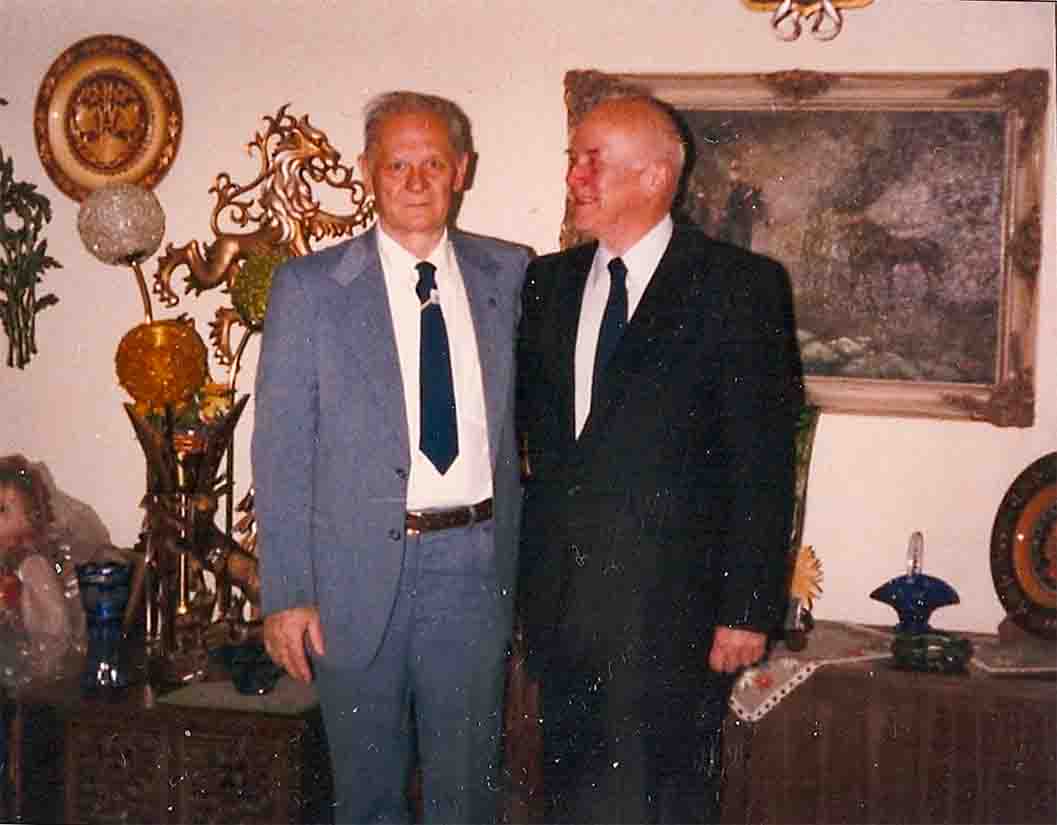
Among the distinguished guests there were also veterans of the Second World War, political activists in exile, historians and journalists such as: General Władysław Anders, Jan Nowak Jeziorański, Jan Karski, Józef Garliński, Cezary Chlebowski, Stefan Korboński, Zbigniew Stypułkowski, Kazimierz Łukomski, Alojzy Mazewski, and Janusz Krzyżanowski. As part of the celebration of the Millennium of the Polish state, Banasikowski invited Primate Stefan Wyszyński to Milwaukee, but the Primate could not come. During the millennium celebrations organized in the most important Polish church — St. Josephat in Milwaukee — the cardinal's throne decorated with flowers was waiting for the Primate. It was a great demonstration of patriotism and love of freedom. In many great cities of America, such cardinal thrones waited for the Primate in Polish churches.
Edmund Banasikowski was also, on the occasion of "Veteran's Day", invited to other cities (London, Toronto) for lectures and meetings. He always spoke about his fight for Poland and for freedom.
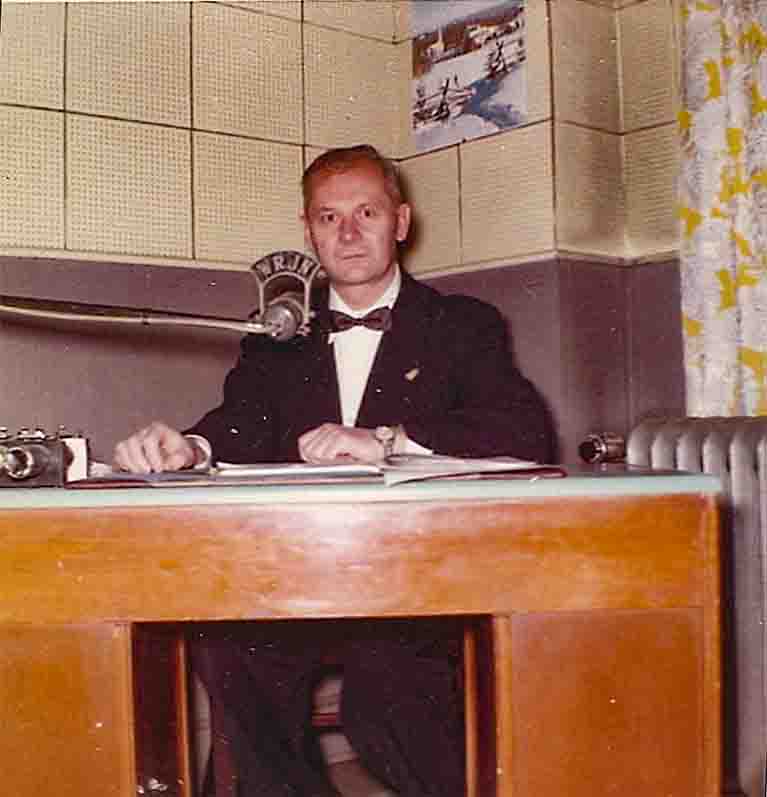
He was a correspondent for "Radio Free Europe", and in Milwaukee he co-edited the radio programs "Echoes from Poland" (Echa z Polski), which began in 1953 and — often broadcast by Radio Free Europe — accompanied the Polish diaspora for 50 years. His articles were published in London in the "White Eagle" (Orzeł Biały) magazine. Edmund Banasikowski wrote political and historical articles, but he also wrote poetry and fairy tales for children. He is the author of the documentary book "Na zew Ziemi Wileńskiej" (Called by the Vilnius Region, 1990). It is in this book that Edmund Banasikowski first mentions the legendary nurse "Inka" — Danuta Śledzikówna — and introduces the concept: "steadfast soldiers". The Association of Polish Writers Abroad, in 1989, presented him with its award.
He ended the war trail with the rank of a captain, but for his work for the independence of Poland he was promoted by the Government of the Republic of Poland in Exile and then by the [Prime Minister] Mazowiecki government to the rank of colonel. He has been honored with many decorations, including: the Silver Cross of the Virtuti Militari War Order, the Cross of Valor, the Golden Cross of Merit with Swords, the Knight's Cross of the Order of Polonia Restituta, and the Commander's Cross of the Order of Polonia Restituta.
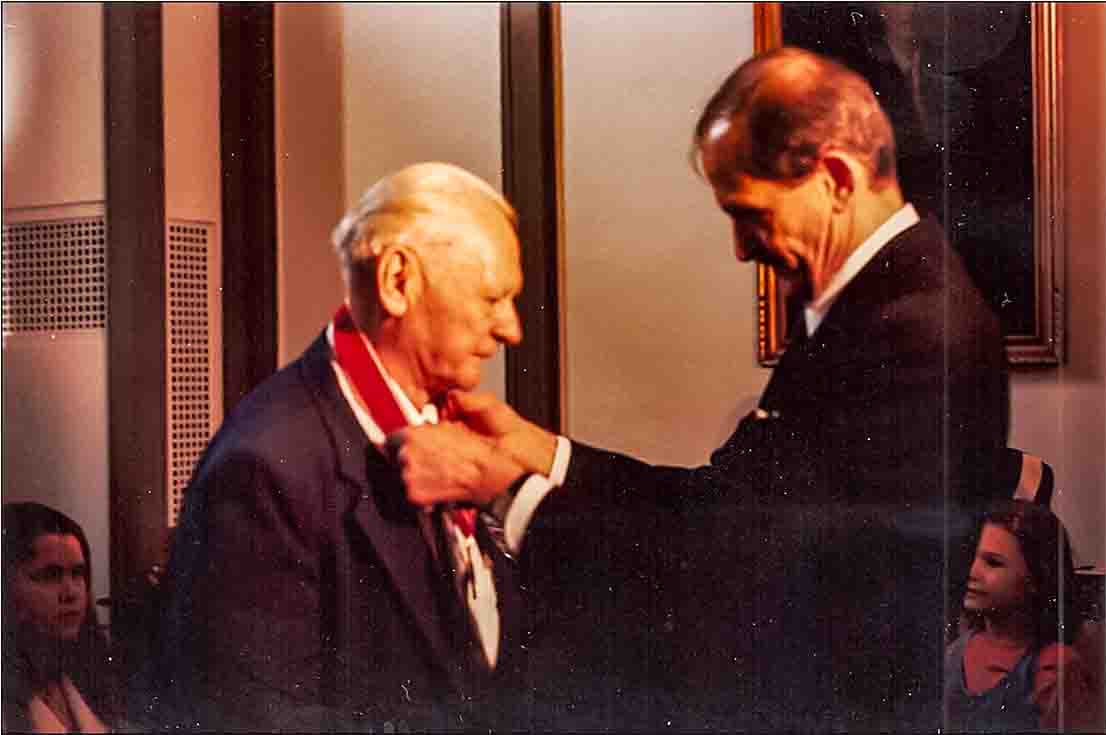
The Commander's Cross, the highest Polish decoration, was awarded to him by the President of the Republic of Poland, Lech Wałęsa, under special circumstances. On May 3, 1993, on the anniversary of the Constitution, he was presented with the medal by the Consul General in Chicago, Michał Grocholski, son of Adam Remigiusz Grocholski, who was the first direct commander of Edmund Banasikowski in "Wachlarz".
It is impossible to list all the merits of Colonel Banasikowski in this article. His rich, heroic, and patriotic life deserves a special monograph. Edmund Jerzy Banasikowski was the president of the Polish American Congress for the state of Wisconsin for 17 years (in the years 1960-1977), the longest in the history of this organization. After 1977 he was its honorary chairman. April 3, 2022 is the twelfth anniversary of his death.
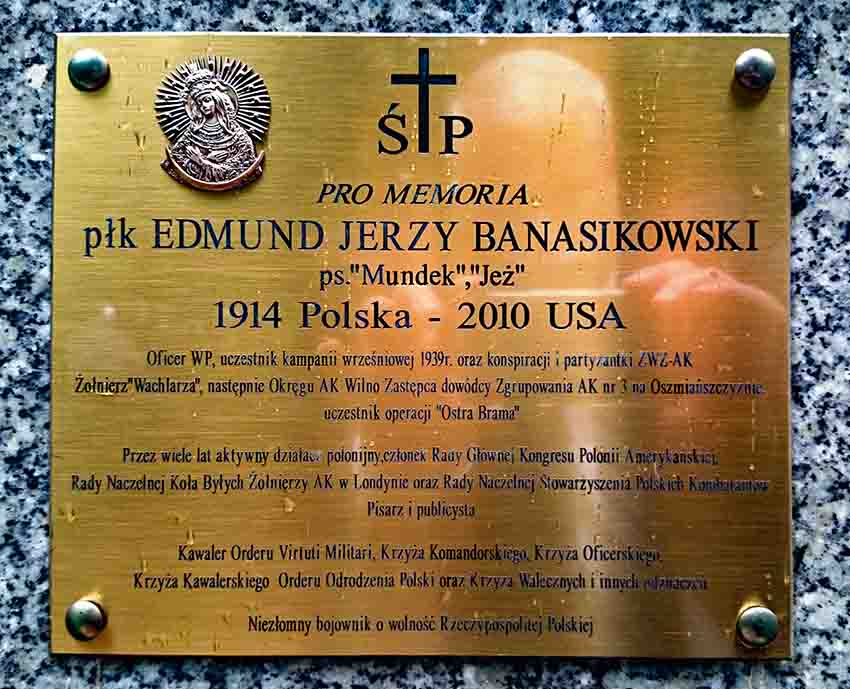
We need to preserve the best, glorious moments for the memory of posterity, we have to ask for respect for our country, for the historical truth, the truth that is distant, or closer, concerning World War II and post-war opinions about the role of Poles in this war. We have to do it together, through important organizations, otherwise our voice will be the voice of "calling from an abyss", inaudible. In the cemetery in Zakopane, there is a wise inscription: "Nations that lose their memory, lose their lives". If we want to preserve our identity, let us also remember about our émigré heroes, about those who built this identity with their actions.
All photos come from the private collection of the Banasikowski Family.
Translated from Polish by Andrew Woźniewicz.



